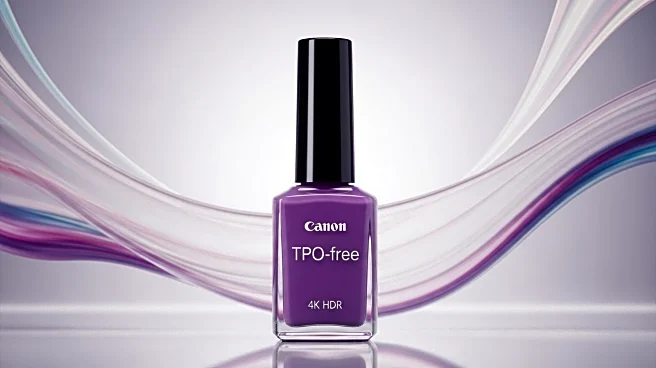What is the story about?
What's Happening?
The European Union has implemented a ban on Trimethylbenzoyl diphenylphosphine oxide (TPO), a chemical commonly used in gel nail polishes, effective from September 1, 2025. TPO has been classified as a CMR 1B substance, indicating potential risks to fertility. This decision affects all EU member states and countries adhering to EU regulations, including Norway and Switzerland. The ban follows studies suggesting a possible link between TPO and long-term fertility damage in animals. As a result, products containing TPO can no longer be sold or used within the EU. The UK plans to enforce a similar ban by late 2026, while the US has not yet regulated TPO. The Cosmetic, Toiletry and Perfumery Association (CTPA) has stated that the ban is precautionary and current products containing TPO are not deemed unsafe.
Why It's Important?
The ban on TPO highlights the EU's commitment to stringent safety standards in cosmetics, aiming to protect human health and the environment. This move could influence global cosmetic regulations, prompting other regions to reassess the safety of similar ingredients. For the cosmetics industry, this ban necessitates reformulation of products, potentially increasing costs and affecting supply chains. Consumers may experience changes in product availability and pricing. The decision underscores the importance of ongoing research and safety assessments in the cosmetics sector, ensuring products meet high safety standards.
What's Next?
Cosmetic manufacturers and distributors in the EU must ensure compliance by removing TPO from their products and confirming future stock is free of the banned substance. Salon owners are advised to check their inventory and dispose of products containing TPO. The industry may see increased research into alternative ingredients that meet safety standards without compromising product efficacy. As the UK prepares for its own ban, companies operating in both regions will need to align their practices accordingly. The US may face pressure to evaluate TPO and similar substances, potentially leading to regulatory changes.
Beyond the Headlines
The ban raises ethical considerations regarding consumer safety versus industry innovation. It highlights the balance between precautionary measures and scientific evidence in regulatory decisions. Long-term, this could lead to increased transparency in ingredient disclosure and heightened consumer awareness about product safety. The cosmetics industry may experience a shift towards more sustainable and health-conscious formulations, reflecting broader societal trends towards environmental and health responsibility.

















